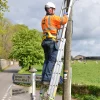Cornwall UK to Approve 99 Percent Superfast Broadband Coverage Goal
The Cornwall County Council (CCC) in south west England looks set to approve a new Superfast Extension Programme (SEP) next week, which will aim to expand the coverage of “fibre broadband” (FTTC/P) connectivity from the currently level of around 95% and make “superfast” (30Mbps+) services available to 99% by March 2019.
The existing £132m Superfast Cornwall project, which is funded by £78.5m from BT and up to £53.5m from the European Regional Development Fund (ERDF), has effectively already achieved its existing target of making “fibre broadband” services available to 95% of Cornwall and the Isles of Scilly by the end of 2014.
Advertisement
Sadly the final completion for that project has slipped slightly, which means that the last 1-2% of the 95% target will now be polished off by March 2015. But take note that only 85% (estimated) of Cornwall will actually be able to receive “superfast” speeds of 30Mbps+. Put another way, approximately 38,000 premises are expected to be below 30Mbps, of which an estimated 13,000 premises will be beyond the “fibre footprint“.
Last year the Government’s Broadband Delivery UK programme announced that it intended to help Cornwall tackle this gap by contributing £2.96m of its budget to a Superfast Extension project. Securing this funding is conditional on 50% public sector match funding and contracts being signed with a supplier by June 2015.
As a result of that the follow-on programme, commencing in July 2015, will aim to deliver over 99% coverage of superfast speeds by 2019. The estimated total cost of this will be £18.747m and Cornwall Council’s contribution is expected to sit at approximately £3.115m (£2.573m capital and £0.542m revenue), although final funding sources and levels have yet to be agreed (dependent upon the contract negotiations).
Cornwall Council Statement
In order to meet the BDUK timescale, the overall project will be split into 2 phases. Phase 1 will focus on the 5% of premises that remain totally beyond the fibre footprint and would be up and running as quickly as possible (BDUK £2.96m, CC £1.878m, Growth Deal £1m, Regional Growth Fund (RGF) £0.5m and private sector) and Phase 2 would follow on once EU funding is secured (EU, CC and private sector).
Moving ahead quickly with the BDUK funding will maintain Cornwall’s leadership position and keep some of the Superfast Cornwall momentum. The alternative of waiting for EU funding to become available would mean a possible further 1-2 year delay, as well as losing the option to draw down the £2.96m allocation from BDUK.
According to council documents, which have been seen by ISPreview.co.uk, Europe is likely to fund the bulk of Phase 2 with a contribution of £9.401m and at that point another £1.113m is also predicted to come from the Private Sector. It probably goes without saying that BT are highly likely to win the contract, just as they have done for every single other major public broadband delivery plan across the whole of the United Kingdom.
Advertisement
Overall Phase 1 will aim to reach 13,000 extra homes and businesses (total of 99% “fibre broadband” and 89% “superfast broadband” coverage by March 2017), while Phase 2 will focus on the next 22,000 premises and by March 2019 should have ensured the 99% coverage goal for “superfast broadband“. Cornwall’s digital strategy is thus roughly in keeping with Europe’s Digital Agenda (i.e. 30Mbps for all by 2020, with 50% subscribed to 100Mbps+).
A final decision will be taken on Wednesday next week, although most expect the plan to be approved. It’s predicted that an additional 815 jobs could also be created, while 3,500 extra enterprises would benefit from the new connectivity.
As a side note, Cornwall is also home to more ultrafast BTOpenreach Fibre-to-the-Premises (FTTP) lines than almost anywhere else in the UK (62,000 at the last count in mid-2014). Not bad considering there are a total of around 253,000 premises in the entire county.
Mark is a professional technology writer, IT consultant and computer engineer from Dorset (England), he also founded ISPreview in 1999 and enjoys analysing the latest telecoms and broadband developments. Find me on X (Twitter), Mastodon, Facebook, BlueSky, Threads.net and Linkedin.
« UPDATE UK ISP TalkTalk Highlights its Green Energy Saving Credentials


















































Comments are closed